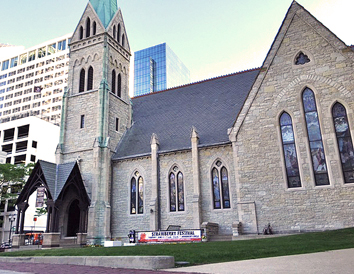JPMorgan Chase & Co. has settled a lawsuit accusing it of mismanaging the trust accounts of Christ Church Cathedral, the historic, Monument Circle church endowed by descendants of drug company founder Eli Lilly.
Lawyers for the bank and the Christ Church Cathedral told a federal judge in Indianapolis on Friday they reached an agreement, according to a court filing. Settlement details weren’t included in court records.
The church, founded in 1837 and listed on the National Register of Historic Places, accused JPMorgan of causing its trusts to lose about $13 million in value from July 2004 to December 2013. The losses flowed from the bank’s decisions to “purchase over 177 different investment products, mostly from itself, using church funds,” according to a complaint filed two years ago.
In May, U.S. District Judge Larry McKinney in Indianapolis
threw out the case against JPMorgan as the parent company, giving the church a month to refile two of the claims asserted against it. That left a breach-of-trust claim against a JPMorgan Chase bank subsidiary, for which dismissal wasn’t sought.
Linda Pence, a lawyer for the church, and Kristen Chambers, a spokeswoman for New York-based JPMorgan, didn’t immediately respond to phone messages seeking comment.
Much of the complaint focuses on JPMorgan's repeated investments in its own
proprietary products, including hedge funds, “structured notes” and other high-fee, opaque investments. By 2009, the suit says, three-quarters of church assets were invested in JPMorgan proprietary products.
“On many of the financial products purchased by JPMorgan from itself on behalf of the church using church funds, JPMorgan made substantially more money than the church, even though the church trusts bore all the risks of the speculative investments,” the suit said.
The trust funds at issue date to the 1977 death of Eli Lilly Jr., grandson of the pharmaceutical firm’s founder, whose will divvied out 10 percent of his remaining estate to the church, where he was baptized and attended his entire life.
In court papers, attorneys at Faegre Baker Daniels representing JPMorgan Chase and the bank argued the suit paints a "grossly inaccurate picture" and that the trust accounts actually were managed well.
“Contrary to the Church’s allegations of fraud and mismanagement, the Bank achieved positive returns for the Trusts through one of the worst financial crises in United States history.”
The bank asserts that, even though the church withdrew more than $13 million between 2006 and 2013, the trust accounts nonetheless increased in value by more than $10 million in that span.
“By omitting these critical facts and cherry-picking a few investments that had sub-par performance, the Church has tried to suggest that the Trustee’s choice of investments for the Trusts was somehow inappropriate. The Church ignores the vast majority of investments that produced solid—and in some cases stellar—returns for the Trusts, and ultimately for the Church’s benefit.”

